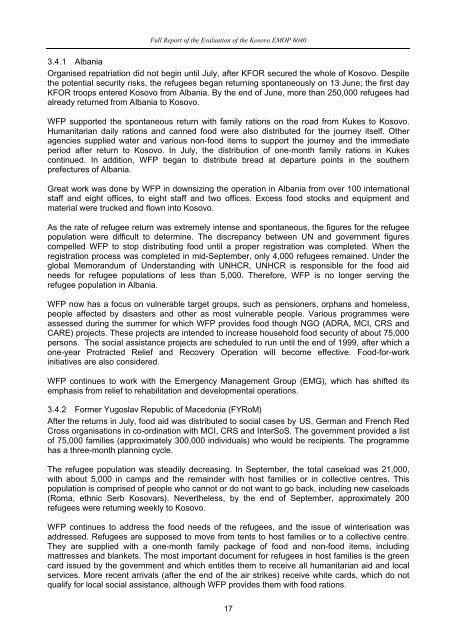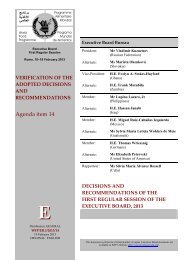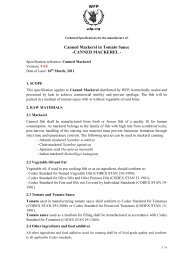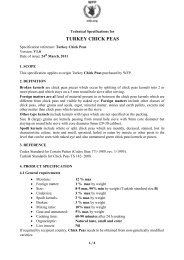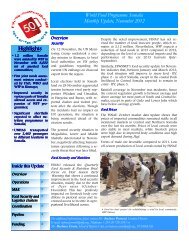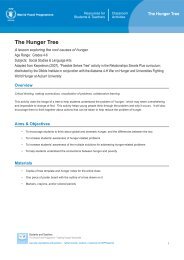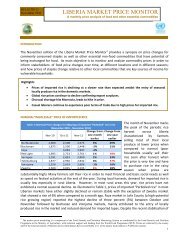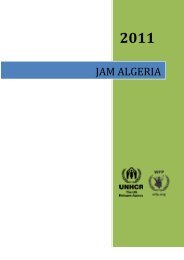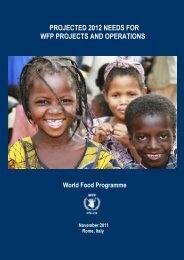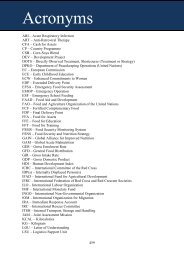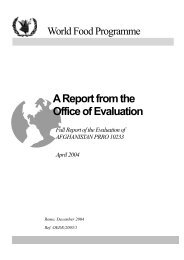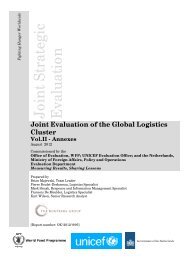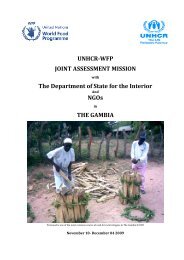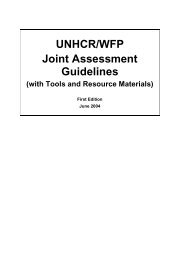Full Report - WFP Remote Access Secure Services
Full Report - WFP Remote Access Secure Services
Full Report - WFP Remote Access Secure Services
You also want an ePaper? Increase the reach of your titles
YUMPU automatically turns print PDFs into web optimized ePapers that Google loves.
<strong>Full</strong> <strong>Report</strong> of the Evaluation of the Kosovo EMOP 6040<br />
3.4.1 Albania<br />
Organised repatriation did not begin until July, after KFOR secured the whole of Kosovo. Despite<br />
the potential security risks, the refugees began returning spontaneously on 13 June; the first day<br />
KFOR troops entered Kosovo from Albania. By the end of June, more than 250,000 refugees had<br />
already returned from Albania to Kosovo.<br />
<strong>WFP</strong> supported the spontaneous return with family rations on the road from Kukes to Kosovo.<br />
Humanitarian daily rations and canned food were also distributed for the journey itself. Other<br />
agencies supplied water and various non-food items to support the journey and the immediate<br />
period after return to Kosovo. In July, the distribution of one-month family rations in Kukes<br />
continued. In addition, <strong>WFP</strong> began to distribute bread at departure points in the southern<br />
prefectures of Albania.<br />
Great work was done by <strong>WFP</strong> in downsizing the operation in Albania from over 100 international<br />
staff and eight offices, to eight staff and two offices. Excess food stocks and equipment and<br />
material were trucked and flown into Kosovo.<br />
As the rate of refugee return was extremely intense and spontaneous, the figures for the refugee<br />
population were difficult to determine. The discrepancy between UN and government figures<br />
compelled <strong>WFP</strong> to stop distributing food until a proper registration was completed. When the<br />
registration process was completed in mid-September, only 4,000 refugees remained. Under the<br />
global Memorandum of Understanding with UNHCR, UNHCR is responsible for the food aid<br />
needs for refugee populations of less than 5,000. Therefore, <strong>WFP</strong> is no longer serving the<br />
refugee population in Albania.<br />
<strong>WFP</strong> now has a focus on vulnerable target groups, such as pensioners, orphans and homeless,<br />
people affected by disasters and other as most vulnerable people. Various programmes were<br />
assessed during the summer for which <strong>WFP</strong> provides food though NGO (ADRA, MCI, CRS and<br />
CARE) projects. These projects are intended to increase household food security of about 75,000<br />
persons. The social assistance projects are scheduled to run until the end of 1999, after which a<br />
one-year Protracted Relief and Recovery Operation will become effective. Food-for-work<br />
initiatives are also considered.<br />
<strong>WFP</strong> continues to work with the Emergency Management Group (EMG), which has shifted its<br />
emphasis from relief to rehabilitation and developmental operations.<br />
3.4.2 Former Yugoslav Republic of Macedonia (FYRoM)<br />
After the returns in July, food aid was distributed to social cases by US, German and French Red<br />
Cross organisations in co-ordination with MCI, CRS and InterSoS. The government provided a list<br />
of 75,000 families (approximately 300,000 individuals) who would be recipients. The programme<br />
has a three-month planning cycle.<br />
The refugee population was steadily decreasing. In September, the total caseload was 21,000,<br />
with about 5,000 in camps and the remainder with host families or in collective centres. This<br />
population is comprised of people who cannot or do not want to go back, including new caseloads<br />
(Roma, ethnic Serb Kosovars). Nevertheless, by the end of September, approximately 200<br />
refugees were returning weekly to Kosovo.<br />
<strong>WFP</strong> continues to address the food needs of the refugees, and the issue of winterisation was<br />
addressed. Refugees are supposed to move from tents to host families or to a collective centre.<br />
They are supplied with a one-month family package of food and non-food items, including<br />
mattresses and blankets. The most important document for refugees in host families is the green<br />
card issued by the government and which entitles them to receive all humanitarian aid and local<br />
services. More recent arrivals (after the end of the air strikes) receive white cards, which do not<br />
qualify for local social assistance, although <strong>WFP</strong> provides them with food rations.<br />
17


